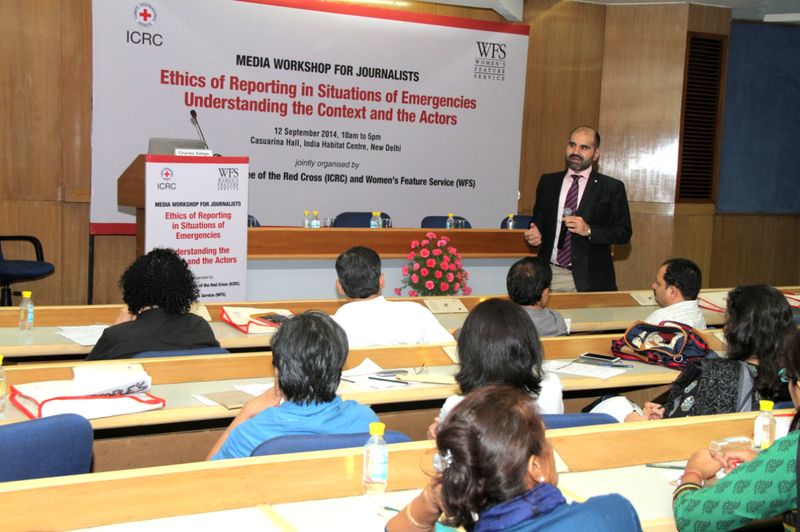 For Aditi Gyanesh who works for a leading national daily in Ludhiana in Punjab, attending a recently organized ICRC workshop for young journalists was a stimulating experience. “Sessions with experienced journalists who have witnessed conflicts and its reality has opened up new perspectives to see things while reporting. It was very important to know how far we can report on the basis of personal experiences during such conflicts.” Aditi is one of the many journalists to have benefited from the ICRC’s media workshops aimed at highlighting how to report emergencies.
For Aditi Gyanesh who works for a leading national daily in Ludhiana in Punjab, attending a recently organized ICRC workshop for young journalists was a stimulating experience. “Sessions with experienced journalists who have witnessed conflicts and its reality has opened up new perspectives to see things while reporting. It was very important to know how far we can report on the basis of personal experiences during such conflicts.” Aditi is one of the many journalists to have benefited from the ICRC’s media workshops aimed at highlighting how to report emergencies.
Across the globe, the ICRC organizes workshops for media practitioners to raise awareness on the important role of the media during emergencies. Over the last 10 years, more than 25 such workshops have been organized by the ICRC in different Indian cities. “We have been organizing workshops in collaboration with the Indian Red Cross Society and other partner organizations here in India where we share experiences of working in some of the most difficult contexts in the world and indeed, it’s been an enriching experience,” says Adebayo Olowo Ake, Communications Coordinator of the ICRC delegation in India. These recent interactions are designed to primarily sensitize the participating journalists on the basics of International Humanitarian Law (IHL), the ethics of reporting conflict and natural disasters, safe practices and the management of dangerous assignments.
“It’s been observed that sometimes the lack of knowledge of International Humanitarian Law and Human Rights Laws prevents reporters from drawing all necessary elements of analysis required to adequately report on conflict or violent situations. Having reported from conflict zones for several years before joining the ICRC, I have felt this void in my journalism career several times and hence when we interact with media professionals in these fora, the idea is to pass on some basics of IHL and increase the awareness of the subject in the reporters mind,” says Surinder Oberoi, a former journalist who is now Communication and Political Advisor to ICRC in New Delhi.
Capturing highlights of one of such ICRC workshops in Hyderabad in 2008, Nava Thakuria of Assam Times had this to say. “Apart from the lack of awareness, the other important reason to carry out the task of educating journalists is to ensure their safety during conflicts.” Highlighting the same, Oberoi adds, “For the last 10 years, in each of these sessions, I have always reiterated that the golden rule of reporting from conflict and other emergency situation is – Be careful of your own safety and don’t become a news item yourself!”
Over the last one decade, about 1000 journalists have attended these training sessions in India alone. The ICRC regional delegation in New Delhi has also facilitated similar workshops in Bhutan, Bangladesh and Maldives in the last few years.

